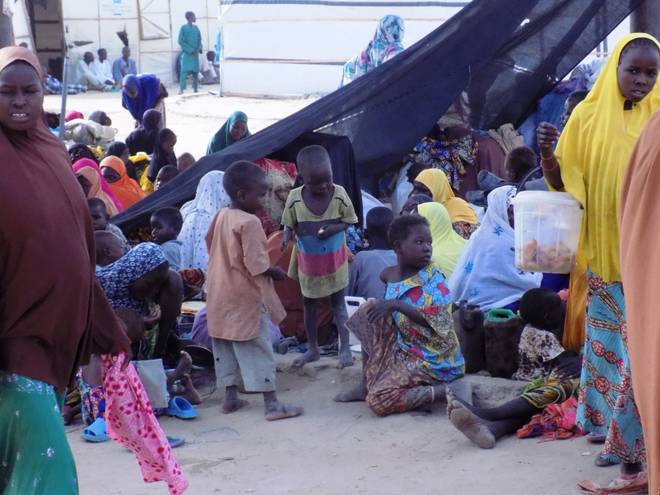4,000 IDPs homeless in Dikwa as rains set in
More than 4,000 displaced men, women and children who fled military operations in the northeastern town of Dikwa are sleeping in the open amidst coming rains, the Norwegian Refugee Council says. “We’re extremely concerned by the dire living conditions of families in Dikwa who’ve recently fled military operations,” NRC’s country director said Tuesday in a […]


More than 4,000 displaced men, women and children who fled military operations in the northeastern town of Dikwa are sleeping in the open amidst coming rains, the Norwegian Refugee Council says.
“We’re extremely concerned by the dire living conditions of families in Dikwa who’ve recently fled military operations,” NRC’s country director said Tuesday in a statement.
“Children are sleeping outside with nothing over their heads. With the rains now hitting the area, they risk becoming sick with malaria, diarrhoea or typhoid.”
 |
| Internally displaced people (IDPs) arriving the transition camp in Dikwa. Daily about 150 IDPs arrive the camp to be screened by the military before allowed into the town. These new arrivals are often held at the screen center for weeks with nowhere to sleep. |
- What to know about Dikwa
- • The population of Dikwa before was estimated at 105,000 pre-2014. It currently stands at about 120,000, with the arrival of displaced people.
- • An average of 100 displaced people has arrived in Dikwa every day since April, as they flee military operations in Ngala, Bama and villages surrounding Dikwa.
 |
| Internally displaced people (IDPs) arriving the transition camp in Dikwa. Daily about 150 IDPs arrive the camp to be screened by the military before allowed into the town. These new arrivals are often held at the screen center for weeks with nowhere to sleep. |
Hundreds of displaced people are said to arrive Dikwa daily after fleeing Mallam Kari village in Bama and other neighbouring communities, due to hostilities between the Nigerian Army and armed opposition groups.
New arrivals must undergo military screening before they are allowed to settle in new towns.
Their numbers overwhelm aid agencies, said the Council.
It says some 600 people are currently being kept in an “unused roofless” petrol station while waiting to be screened.
Some 4,000 others already screened are being held at a reception centre before being given temporary shelters.
 |
| Internally displaced people (IDPs) arriving the transition camp in Dikwa. Daily about 150 IDPs arrive the camp to be screened by the military before allowed into the town. These new arrivals are often held at the screen center for weeks with nowhere to sleep. |
NRC says the centre is filled “to the brink”, forcing families to sleep outside.
It is common to see up to 15 women cramped in a single room while the men sleep outdoors, it said in a statement.
“Our schools have been turned into camps for displaced families and our children can’t access education. This worries me a lot,” says Kachalla Isa, the head of the community.
Only three of the eight schools in Dikwa are functional. Four schools are housing displaced people, while the army is using one as a military base.
NRC says it has so far built over 1,300 temporary homes for the new arrivals, and plans to build more shelters and toilet facilities in the coming weeks.
NRC has questioned military ‘s claim that it takes an average of two weeks to clear the displaced people.
It said the same screening last year took as long as one year in some cases when the military claimed some women were wives of Boko Haram insurgents.
